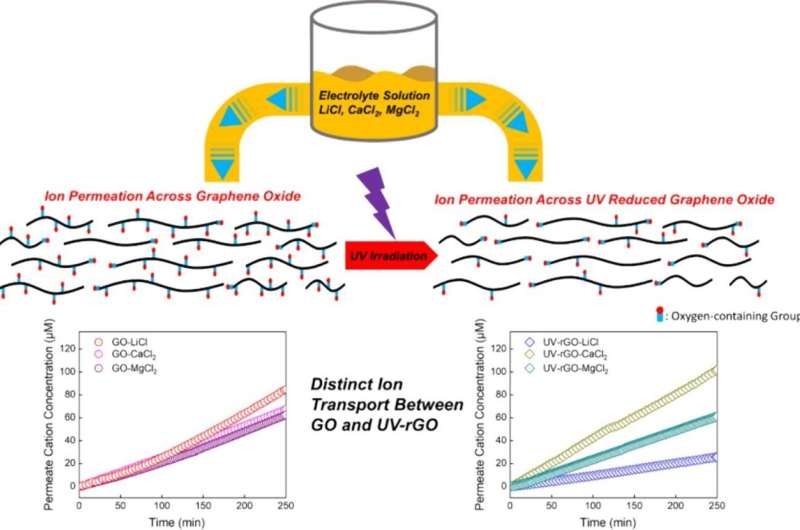
Credit: Chemical Engineering Journal (2024). DOI: 10.1016/j.cej.2024.152304
Developing efficient, selective, and scalable separations for critical materials, including lithium and magnesium, is essential to meeting the increasing demands for clean energy technologies and alleviating challenges with domestic supply chains. Graphene oxide (GO) membranes have shown promise for separating ions from mixed solutions based on size.
While previous work used GO membranes for size-based separations, UV light reduction expands the potential uses of GO membranes by altering the separation mechanism. This modification approach allows researchers to tune the functionality of GO membranes via a straightforward method that uses no harsh or specialty chemicals.
Scientists discovered that reducing GO membranes with ultraviolet (UV) light alters the oxygen functional groups on the GO surface. This modification results in a different, chromatography-like separation mechanism that is selective for charge rather than size.
Larger, doubly charged cations, such as calcium, move through the membranes faster than smaller, singly charged cations such as lithium. The work is published in the Chemical Engineering Journal.
The smaller lithium cations permeate more slowly through the UV-rGO membranes than larger cations, such as calcium and magnesium, resulting in a 3- to 4-fold improvement in the separation selectivity between these representative cations.
UV exposure selectively removed hydroxyl (–OH) groups from the GO basal planes, leading to enhanced interactions of metal cations with functional groups located at the edges of GO. This resulted in a lower ratio of free mobile lithium in solution compared to calcium cations. A separation mechanism analogous to chromatography is proposed for UV-rGO, emphasizing the crucial role of different oxygen groups on GO in controlling selective ion transport through GO membranes.
More information:
Yiming Yin et al, Distinct ion transport behavior between graphene oxide and UV-irradiated reduced graphene oxide membranes, Chemical Engineering Journal (2024). DOI: 10.1016/j.cej.2024.152304
Citation:
Surface oxygen functionality controls selective transport of metal ions through graphene oxide membranes (2024, July 25)
retrieved 25 July 2024
from https://phys.org/news/2024-07-surface-oxygen-functionality-metal-ions.html
This document is subject to copyright. Apart from any fair dealing for the purpose of private study or research, no
part may be reproduced without the written permission. The content is provided for information purposes only.
>>> Read full article>>>
Copyright for syndicated content belongs to the linked Source : Phys.org – https://phys.org/news/2024-07-surface-oxygen-functionality-metal-ions.html










